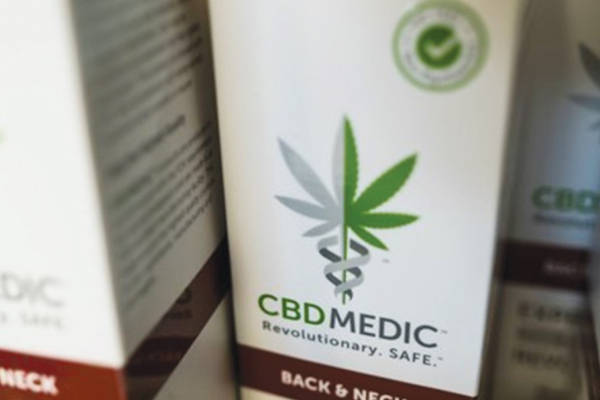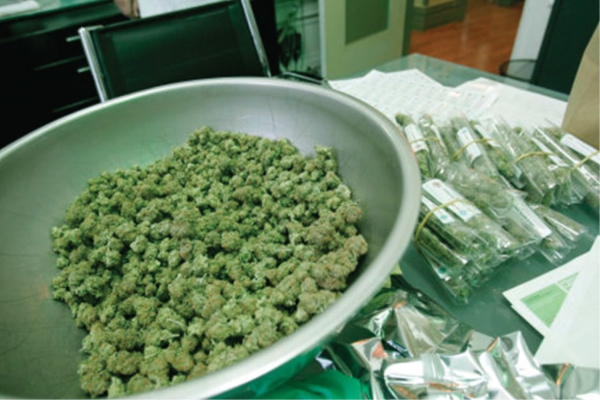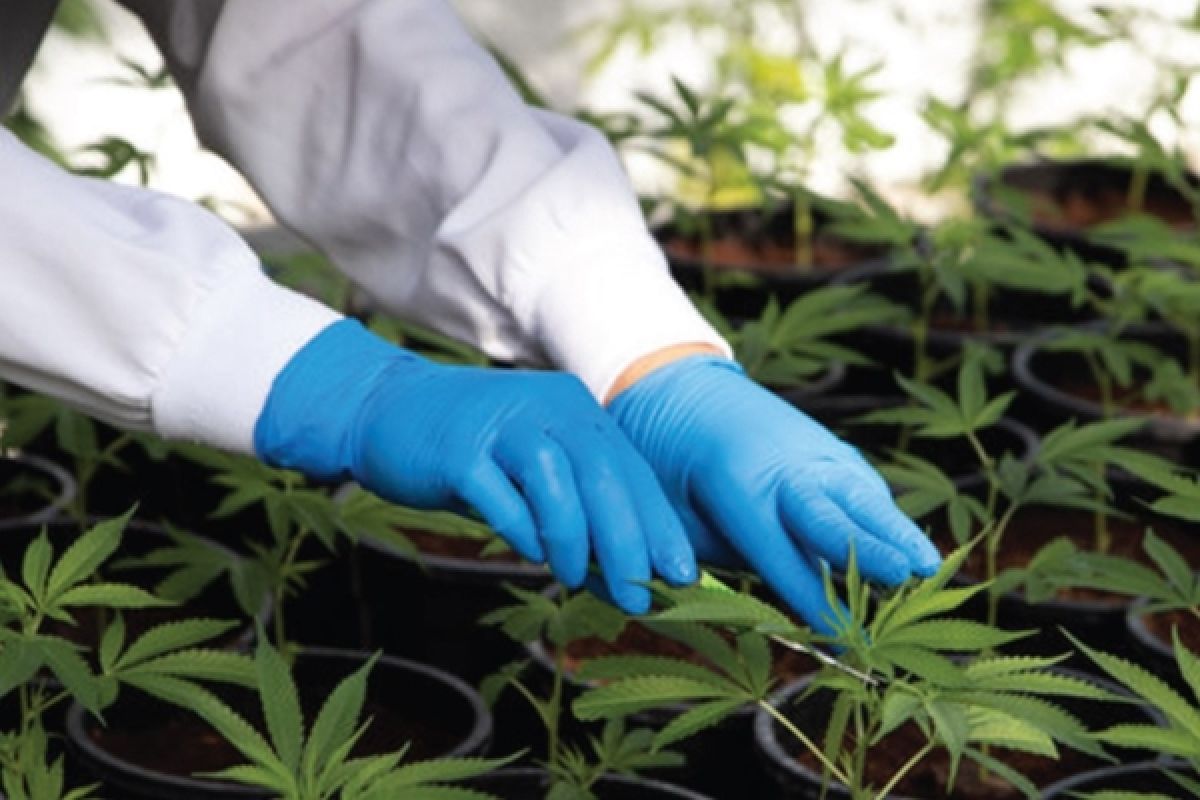A family-friendly pick-your-own fruit farm might not be the most likely location for large-scale cannabis cultivation.
But Polkadraai Strawberry farm in Stellenbosch recently received the first commercial license in South Africa to do just that.
With the go-ahead given by the South African Health Products Regulatory Authority, the farm, an hour’s drive from Cape Town, expects to produce 20 tonnes of dried cannabis a year in its 46,000sqm greenhouse, situated alongside its rolling strawberry fields.
The licence is exclusively for growing marijuana for export and not for manufacturing products for sale or consumption.
This means seeds will be imported and the cannabis exported and transformed into everything from anti-anxiety medication and supplements to drinks made from cannabis-derived CBD oil.
Ever since A-list names, including Jennifer Aniston and Kim Kardashian, opened up about their love for oils, drinks and lotions infused with CBD, demand for these products has skyrocketed in the Western world.
Attitudes towards the medicinal benefits of cannabis are also changing, and investments into research in this field have soared.
Cannabis, which is legal for recreational use in some US states, legal for medicinal use in others, and strictly prohibited in the rest, has been touted for a wide variety of health issues, with the strongest scientific evidence around its effectiveness in treating childhood epilepsy.
In Israel it has been used to treat soldiers suffering from post-traumatic stress disorder.
And the UK is considering prescribing cannabis-based products for a whole range of medicinal uses.
At present, its use in Britain is limited to doctors on the General Medical Council’s ‘Specialist Register’, but it’s hoped all GPs will soon be allowed to offer the drug to patients suffering from anxiety, insomnia and chronic pain.
The global market for medical cannabis is currently estimated at $150 billion and could reach $272 billion in 2028, according to Barclays Bank. Europe’s medical cannabis industry alone will be worth an estimated $2.79 billion by 2025, with the non-medical CBD market estimated to rise to $16.5bn in Europe by 2025.
It’s no wonder David Beckham is making moves into the cannabis-based skincare industry via his investment vehicle, DB Ventures. And if you need any proof of changing attitudes around cannabis products, look at Yohanan Danino, the chairman of Together Pharma, Israel’s biggest manufacturer and distributor of medical cannabis, who also happens to be a former police chief.

Booming demand for these products in Europe and North America is prompting African countries to rethink their own policies on cultivation.
Since 2017, a number of African states have legalised cannabis farming for medicinal or industrial purposes, including Zimbabwe, Zambia, Malawi, Lesotho, Uganda and South Africa.
In October 2020, Rwanda joined the list, having approved the cultivation and export of cannabis, even though the use of it for both medical or recreational purposes remains illegal in the country.
Driven by the potential boost to export earnings, the Rwandan government is already in talks with four European and American companies about growing and processing cannabis for export to meet rising pharmaceutical demand.
The move could help shore up Rwanda’s state coffers, which have been hit hard by global Covid-19 lockdowns.
Back in South Africa, and the owners of Polkadraai Strawberry Farm – brothers Barry, Leslie and Julian Zettler – are already planning to extend their growing capacity, despite facing a number of initial challenges.
‘Our license is strictly for cultivation only, and we’re still waiting for [regional] companies to be licensed to manufacture and take our product and turn it into CBD oil, tablets or any other cannabis-based products,’ Leslie Zettler told Cape Talk radio.
‘We’ve got the license to cultivate and export, but I can’t sell it to the public and I can’t make finished goods.
‘I can only sell it to a licensed entity who is authorised to turn it into a finished product and those licenses haven’t been issued yet.’
With the supply chain stunted somewhat, the brothers are focusing on rebuilding their greenhouse ‘to make it more cannabis-specific’ while ensuring their crop is of the highest quality.
‘We need to make sure the materials or seeds we bring in are 100 per cent clean so we have a reliable import for seeds, and that’s still in process,’ he added.
'We are currently experiencing a lot of challenges, but until things start to open up, we are just going to be testing and getting everything ready.’
In Uganda, farmers face similar roadblocks following initial breakthroughs.
In April last year a Ugandan farm, run by Industrial Globus, a joint venture between Industrial Hemp, a local business, and Israel’s Together Pharma, dispatched Uganda’s first ever commercial cannabis exports.
It’s the country’s first and, so far, only foray into the medicinal cannabis market.
The cannabis is grown and stored at the farm outside the Ugandan town of Kasese under tightly controlled conditions in vast greenhouses roughly the size of four football pitches.
The plants are watered with hi-tech irrigation systems and labelled with barcodes, with strict procedures designed to comply with World Health Organization standards for ‘Good Agricultural and Collection Practices’. The cannabis is then escorted to the airport by anti-narcotics police, flown out of the country and sold to pharmaceutical companies around the world.
The opportunities for marijuana growers in Uganda are enormous, but are currently limited because Ugandan policy towards cannabis is a haze of confusion.

‘It is still a controversial crop in Uganda,’ explained Benjamin Cadet, a director at Industrial Globus and a former Red Cross worker. Cadet sat in the Ugandan parliament between 2011 and 2016 and took an interest in medicinal cannabis after leaving politics.
‘We have two camps, the science-driven camp and the morality-driven politicians who thought maybe we were going to pollute morals.’
The farm employs about 110 workers, mostly from the surrounding villages, who earn 16,000 shillings ($4.30) or more a day.
But despite the apparent benefits to the local economy, no other Ugandan farms have been awarded a commercial licence since 2012, despite scores of entrepreneurs and local firms having applied.
This is largely down to strict requirements to enter the industry imposed by the Ugandan government. These rules cover areas such as security and minimum levels of capital, which many Ugandans feel is immediately setting them up to fail.
Meanwhile, international firms like Together Pharma have the capital and experience to overcome government restraints. The situation has left a sour taste in the mouths of local businesses put off by red tape.
But it’s not all bad news. In April this year Lesotho, which has already attracted multi-million-dollar investments from as far afield as Canada, became the first African country to be granted an EU licence to sell medical cannabis in Europe.
The country’s top medical cannabis producer, MG Health, announced it had met the EU’s Good Manufacturing Practice standards, allowing it to export cannabis flower, oil and extracts as an active pharmaceutical ingredient.
This breakthrough could create thousands of jobs for villagers and help open doors for more exports to other global markets such as France, the UK and Australia.
The economic potential for African countries is huge, according to experts.
A 2019 report by Prohibition Partners, a UK-based market intelligence firm, profiled nine African countries and estimated that, if they all fully legalised cannabis use, the market would be worth more than $800m for medicinal cannabis by 2023, and $6.1bn for recreational cannabis by 2023.
The global market for cannabis is still young and unpredictable, but optimists believe the sector is going to be huge as demand continues to grow. The well-being sector alone has seen a flood of CBD products launched onto the market, including tinctures, oils, gummy sweets and topical creams, while CBD products for pets are also making an appearance.
Despite the challenges faced on Polkadraai Strawberry farm, Leslie Zettler is looking towards a bright future. ‘This is probably the most new and exciting industry out there,’ he said. ‘There is a huge amount of research going into new products and developing what the different strains can do, and it’s just incredible what’s going on. It’s very exciting.’






